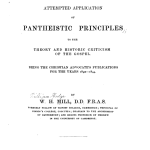
As a graduate of the University of Durham, you might suspect that I have a soft spot in my theological heart for Jimmy Dunn and N.T. Wright – and I do. Generally speaking, I think folks like Dunn, Wright, and Hays have done far more good than damage in their work on Paul in the last few decades.
But I am no blanket endorser of the “New Perspective” and I think there are folks who have tried to see some middle ground between “old” and “new” (Howard Marshall and Brian Rosner come to mind). On the “old perspective” side, you have Schreiner, Piper, Seifrid, Carson, and Moo. I seriously struggle with some of their interpretations of Galatians (more on that on another occasion after I finish Moo’s Gal commentary). But I think one of the finest “old perspective” advocates is Stephen Westerholm. And for those of you critical of the NPP, you will be happy to know that I found much agreement with Westerholm on the topic of justification in his new book, Justification Reconsidered: Rethinking a Pauline Theme (Eerdmans, 2013).
Even though it is a short book, it is surprisingly wide-ranging, so I will limit the discussion to three issues that Westerholm treats.
1. Is Stendahl correct? Was Luther wrong to think that “justification” language has to do primarily with vertical (soteriological) issues rather than horizontal (Gentiles accepted as Gentiles; social) ones? I think Westerholm quite easily rebuts Stendahl’s approach by making appeal to 1 Thessalonians. Even though justification language does not feature in 1 Thess, it is a text that reveals the nature of Paul’s Christian preaching, which certainly included appeal to divine wrath and the possibility of deliverance through Jesus Christ (1 Thess 1:9-10). He argues: “The notion that a deity might be angered by their actions was nothing new, and divine displeasure was a dangerous thing” (5). In response to Stendahl, and in particular reference to evidence from 1 Thess, Westerholm wryly writes:
“If ‘the leading edge of Paul’s theological thinking was the conviction that God’s purpose embraced Gentiles as well as Jew, not the question of how a guilty man might find a gracious God,’ [Westerholm quoting Stendahl] and if the latter question marks rather the concerns of the later West, then it must be said that Paul’s message to the Thessalonians left them in the dark about the core of his thinking while pointlessly answering a question that they were born in quite the wrong time and place to even dream of raising” – (ZING! Touche, Westerholm!; 6)
I think Westerholm is highly persuasive on this matter.
2. Is Tom Wright correct? Is Paul’s “justification” language all about being “declared to be a member of God’s people” and a label for the covenant people, the children of Abraham?
From Westerholm’s study of the OT and Paul, he concludes that there is a pervasive meaning of dik* lanuage in reference to salvation on behalf of the ungodly (see 67). Especially regarding Galatians, Westerholm writes, “the word ‘justify’ cannot mean what Wright wants it to mean; no Galatian would have heard ‘justified’ and thought ‘entitled to sit at the family table’; nor would Paul (who elsewhere uses dikaio– terms in their ordinary sense) have used this word here if that was what he wanted to say.” (68). Rather than focusing the language on covenant or covenant membership, Westerholm argues that righteousness refers to the universal standard of rightness established by God.
I think, generally speaking, Westerholm is correct on this matter. Justification/righteousness language does not designate covenant inclusion per se. However, Gal 2 makes it clear enough there is an in-group issue at hand and Paul takes words that normally have a vertical force (soteriology) and draws them into the very social discussion in Galatia. For example, he tells Peter that “We ourselves are Jews by birth and not Gentile sinners” (2:15). By “sinner,” the normal force would have nothing to do with ethnicity, but in this context that element is noticeably at the forefront, is it not? Or 2:17: “But if, in our effort to be justified in Christ, we ourselves have been found to be sinners” – what does it mean here to be “sinners”? No doubt, most interpreters take this to mean like the Gentiles (in view esp of 2:14).
So, to try to do justice (!) to Westerholm’s concern for the meaning of dik* language, I would agree with him that its denotative meaning is vertical (soteriological), but in the context of Gal 2-3, it takes on a connotative meaning related to Jews and Gentiles as social groups (where meal fellowship and circumcision, and matters of social inclusion/exclusion are at play).
3. Is justification about social groups or is it about sin?
Westerholm is absolutely right to give a special focus on Paul’s theology of sin. Westerholm defends the Augustinian and Reformational emphasis on sinful depravity, such that Paul is compelled to preach the need for sinners to be justified before God in Jesus Christ.
“Like Paul, these interpreters of his writings are convinced that human beings untransformed by the gospel cannot (really) do good; unlike Paul, they spell out that what distinguishes the apparent virtue of the untransformed from true virtue is their failure to give God his due. Where God is not honored, something basic is awry, spoiling even what would otherwise be good” (48)
I think this is right, and that Paul had a vocational passion to preach good news to hopeless sinners. The one thing, though, that makes me hesitate here is how to interpret Phil 3:6 if Westerholm is correct: what does it mean that Paul calls himself “blameless” when it comes to righteousness under Torah? I don’t have answers of my own, but yet-unanswered questions.
I think we are waiting for a good (hopefully affordable!) monograph on Pauline hamartiology.
Last Words
So, in the end, Luther was on to something when it comes to justification. I have some quibbles with Westerholm’s reading of Galatians, but overall this is a fine treatment of the subject of justification and he has ably challenged Wright to, once again, say a bit more on how he reads dik* language in Paul (esp in Galatians) and to further defend his ideas.











